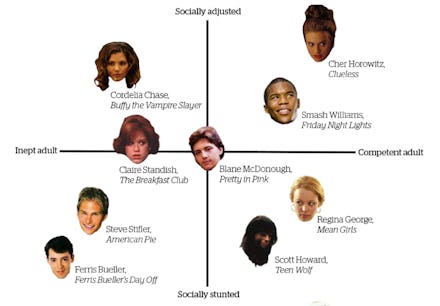What Really Happened to the Cool Kids in Your High School

Image Credit: Facebook
Try not to act too surprised at your next high school reunion: A new study shows that popular kids end up having more trouble after they become adults.
The study, published this month in Child Development, found that popularity tends to fade by age 22, at which point many cool kids are left with less social aptitude and maturity than their peers. By that age, the study found, the popular kids have a 45% higher rate of drug- and alcohol-related problems, like drunk driving and skipping out on work, and were also more likely to take part in criminal activity.
Pop culture isn't helping either, according to University of Virginia psychologist Joseph Allen, the study's lead author. "What the media does, I think, is it portrays this fast life in very glamorous terms," he told NPR. "[It] sets up an expectation that teens should be acting older."
That got us thinking: Movies and television shows are full of the popular kid stereotype — jocks, bullies, rich prom queens and the occasional hypercool high school hero. Given what we know now, how would they adapt to adulthood?
Well-liked high schoolers Cher Horowitz and Brian "Smash" Williams had their struggles — driving tests and steroid use, respectively — but their ability to work through those issues and stay friends with their classmates and teammates bodes well for their impending adulthood (thanks Coach Taylor!). Regina George's social scheming and thirst for power probably won't translate well in adulthood, but she certainly seems capable of holding down a career and paying her taxes. Ferris Bueller is another story. He may think skipping out on school, coercing his friends and lying to everyone around him count as a whimsical teenage lust for life, but take those things into adulthood and they start to look a lot more like sociopathy.
Behind the study: Researchers followed more than 180 13-year-olds at urban and suburban public schools in the Southeast for a decade, interviewing them as well as family members and friends. The more popular teens were viewed by fellow students as more adult, but that had flipped by age 22.
"We call it the high school reunion effect," Allen told NPR. "By 22 they were seen by their peers as being less socially competent and less mature."
So if you were a shy nerd in high school, turns out your future may have been brighter than you thought. And if you were a popular social butterfly? A study won't determine your future, but it might be worth making sure you're not still trying to impress everyone around you like you did at 16. In real life, after all, the credits don't roll after graduation.